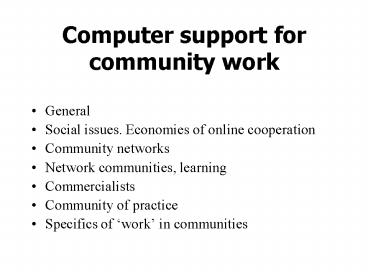Computer support for community work - PowerPoint PPT Presentation
1 / 13
Title:
Computer support for community work
Description:
Very hard to define in sociology (shared interests, passions, ... Howard Rheingold, 1993, 'The ... due to the 'Grateful Dead' fans. Social Issues ... – PowerPoint PPT presentation
Number of Views:37
Avg rating:3.0/5.0
Title: Computer support for community work
1
Computer support for community work
- General
- Social issues. Economies of online cooperation
- Community networks
- Network communities, learning
- Commercialists
- Community of practice
- Specifics of work in communities
2
General community
- Very hard to define in sociology (shared
interests, passions, goals, routines, procedures,
values, etc) - A clear agreement among CSCW researchers that
supporting only 9-17 work is not enough - There are activities outside the conventional
employed work that can, and do, get computer
support IRC, MUD, electronic conferences, BBS
3
General early community
- Howard Rheingold, 1993, The Virtual Community.
Homesteading at the electronic Fronteer WELL, a
grassroots movement - Dial-up electronic conference
- Getting help from the community on issues like
parenting Life and death in the community - Barn raising and horse trading a gift economy
- Economic viability due to the Grateful Dead fans
4
Social Issues
- Smith and Kollock, Communities in cyberspace,
1996 - Identity and deception gender swapping, race,
sex-on-the-phone, boundary-crossing behavior,
anecdotal - Governance (see also Curtis, MUDs)
- Structure
- Collective action
5
Social Issues Cooperation
- So, why do people cooperate? (e.g. Usenet
expertise) (Kollock and Smith) - The tragedy of the commons
- Mathematical models, prisoners dillemma (Axelrod
1984), iterative versions - Usenet and mailing list economics, lurkers and
suckers - Linux, the impossible public good
6
Community Networks
- Enhancing local communities with network support
- Alarming signs of the dissapearance of community
in the American society, Putnam, Oldenberg - Dough Schuler, 1994, research and social activism
- Public CSCW
- Carroll et al., The Blacksburg Electronic
Village - Better home shopping, or new democracy?
7
Network communities
- Mynatt et al. 1997-1999
- Derived as an archetype from Media spaces and
MUDs - robust and persistent, locality spans the
social and the virtual - Persistence, periodicity, boundaries, engagement,
authoring
8
Learning in Communities
- Bruckman, constructionist learning MOOSE
Crossing - ODay et al., from a MUD to a learning place
- Relying on a social practice to simplify
technical implementation - Designing technical mechanisms to achieve a
social objective - Similar tools with different social effects
- Co-evolution of social and technical mechanisms
9
Commercialists
- Engineering a new community for a commercial
purpose (e.g. the community of X cereal eaters) - Lists of guidelines (e.g. Kollock, 1996, Andrews
2002, Goodwin 1994) - Design principles, no algorithm, no
step-by-step recipe
10
Kollocks design principles
- It must be likely that two individuals will meet
again in the future - Individuals should be able to identify each other
- Group boundaries must be clearly defined
- Rules are well matched to the local needs
- Self-governance
- Confront members with a crisis
11
Community of practice
- Legitimate peripheral participation
- Learning slowly advance from the periphery to
the core of the community - Double-knit organisations (McDermott)
- Minority disciplines (Muller)
12
Amateur Radio Community
- Contingencies of communication. An
experiumentation medium - The challenge of making radio work
- Peer review of contributions
- The power of the audience. The public
- Pioneering new directions in radio (Ham and
public)
13
Specifics of work in communities
- Challenge, contingency, pioneering, audience,
peer-review - Applying to voluntary student work
- Situated action, contingency
- Community work pleasurable situatedness
- Reading back the findings into other community
literature






![[CSCW] Computer Supported Cooperative Work PowerPoint PPT Presentation](https://s3.amazonaws.com/images.powershow.com/7918627.th0.jpg?_=20160622076)
























